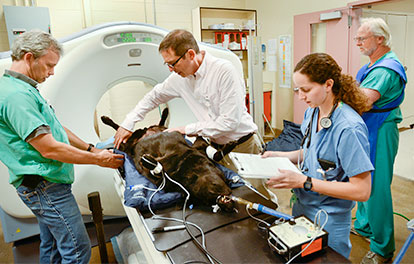UNC, NC State and Duke collaborate on high tech cancer treatments
How beagles and goldens could help researchers find the next cancer therapy for humans
DAVIS, Calif. — Radiation oncologist Dr. Michael Kent desperately wants to beat cancer. He's testing the latest high-tech treatments in clinical trials and using a multimillion-dollar linear accelerator so he can offer the best care to patients — whether they're beagles, golden retrievers, or the black and white terrier mix named Moo he's now treating for a recurrent tumor in her paw.

Don Preisler/UC Davis School of Veterinary Medicine
Kent is a veterinarian. Frustrated by the lack of treatment options for dogs with certain tumors and cancers that have metastasized, he's searching hard for new treatments to extend the lives of his patients. But because the biology of dogs and humans is so similar, what he finds here at the UC Davis School of Veterinary Medicine could well help treat human cancers as well.
"For a long time, we've looked at humans to see how to treat dogs," Kent said. "We're starting to do a little bit of the reverse now."
This field of comparative medicine — using animals to better understand and treat human disease — is not new; creatures such as mice, rats, and actual guinea pigs have long been the mainstay of medical research and studies of experimental drugs. What's different is that veterinarians are now conducting rigorous clinical trials of new treatments with the hope they might eventually benefit humans as well as the family pet. Increasingly, they're using dogs and cats and other companion animals in these experiments, as medical researchers recognize the limitations of traditional lab animals.
This work comes at a critical time, those in the field say, because so few oncology drugs — or drugs for many diseases for that matter — end up getting approved for use in humans after showing early promise in lab studies.
"There's things we find in the lab that we think might be helpful, then we get to the clinic and they either don't work or are toxic," said Dr. Arta Monjazeb, a radiation oncologist at UC Davis Comprehensive Cancer Center who's partnered with Kent to test new treatments in dogs. One immune therapy that the two recently tested to shrink metastatic lung cancer in his dog patients will soon enter clinical trials in humans at Davis.
While Monjazeb never expected to be working alongside veterinarians when he entered medicine two decades ago, he said he's embraced work with pets in hopes it will speed discovery of new drugs, a process he finds painfully slow. "There's a sense of urgency," he said. "A lot of patients still need new treatments."
Other vets are testing stem cell treatments on pets, as well as cutting-edge CAR-T cell therapy, which harnesses a patient's own immune system to kill cancer cells. Kent has a new paper coming out soon on using a dog's own natural killer cells, a type of blood cell, to attack osteosarcoma, a bone cancer that's remarkably similar in humans and dogs.
At many of the nation's top veterinary schools — and even at prestigious medical schools such as Stanford — veterinarians are working closely with M.D.s and Ph.D.s to further clinical research in a host of intractable diseases using a broad range of animals.
"The field is building momentum," said Dr. Kathryn M. Meurs, associate dean at the North Carolina State College of Veterinary Medicine, which is part of a large Comparative Medicine Institute where veterinarians regularly collaborate with doctors at Duke University and the University of North Carolina. "It's taking on more substantial problems like cancer, infectious disease, cardiology and neurology," she said.
Read more at statnews.com.
By Usha Lee McFarling @ushamcfarling